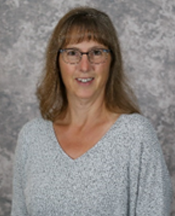Jennifer Anders
Math
Harding County School District

Jennifer Anders teaches math at Harding County School District. She has been teaching for 28 years.
What made you decide to become a teacher?
I think it was the teachers I had throughout my school years. I wanted to be a teacher for as long as I can remember. I had some wonderful teachers throughout my elementary and high school years.
I grew up in Faith, S.D. I went to K-12 there. It’s a very rural community. It’s wonderful to be a part of a community that is like the one I grew up in.
What’s the best part of teaching?
That lightbulb moment for students when they realize that they can do it. When they realize, this makes sense, that this is useful for something. They don’t always see Algebra as something they might use in everyday life, but when they realize the ways they can use it, they get more engaged in it, and their motivation goes up.
What’s the most challenging part of teaching?
Getting students to realize that they have the ability to do math, to do hard math, and tearing down the wall that they’ve built in their lack of confidence in themselves, as far as math ability goes.
A lot of students have a preconceived notion that math is hard, and that they’re going to struggle. So one of the first things we have to do is get rid of that idea.
It’s so rewarding to help them overcome that lack of confidence and watch them grow when they realize that they can do math.
What’s the most useful advice you can give to a new teacher who’s just starting out?
Give yourself grace would be one thing. We tend to be pretty hard on ourselves, and always feel like we’re not doing enough, trying to reach every student where they’re at. If you care about the students, the content will come.
Be flexible because things happen. You might come in that morning with a plan, and something happens that throws a wrench in the plan. If we didn’t get done exactly what I had planned, that’s okay – we’ll get it done tomorrow.
What do you think teaching will look like in 15 years? What sort of changes do you expect to see?
I hope that the personal touch doesn’t leave. But I do expect to see the possibility of a more digital, individualized approach, where the students may be in my Algebra I class, but they have a program on a device and it’s going to lead them through what they need to learn. They can probably use AI to help them where they need instruction, where they need something to guide them through. Each student could be on their own path, their own level, but still getting the skills they need through an AI tutor.
I hope that doesn’t replace a human teacher in the classroom, because I don’t think learning is as good without other people. We’ve had some of that already with Covid, and we had to be away from each other, and isolated, and I hope we have learned lessons from that, the importance of human presence in our lives.
What will stay constant?
Where we are, education will remain important. Kids are still going to want to do very well. Kids are very competitive here. They have a good work ethic. We’ll still continue to try to challenge them, to do their best, and push them no matter what the requirements are. I don’t think the requirements are going to change – the four years of math and English, etc.
Do you have any, “it’s weird but it works” teaching strategies?
I’m not a huge fan of tests. We don’t do a lot of tests in my classroom. I assess in a more informal manner. I think teachers – we teach something, there’s a test, they get a grade, we move on. I find that students think math is hard already, and they have test anxiety. To me, a test is not a measure of what they know – it’s a measure of what they know at that time, based on what they studied the night before.
Do you have anything to add?
I don’t see myself doing anything else. Teaching is something I’ve always wanted to do.
I’m grateful to God for giving me the ability to be here every day. It’s so rewarding to see students succeed. I’m grateful to be there. It’s fun to form bonds with the kids, especially in a small town.
